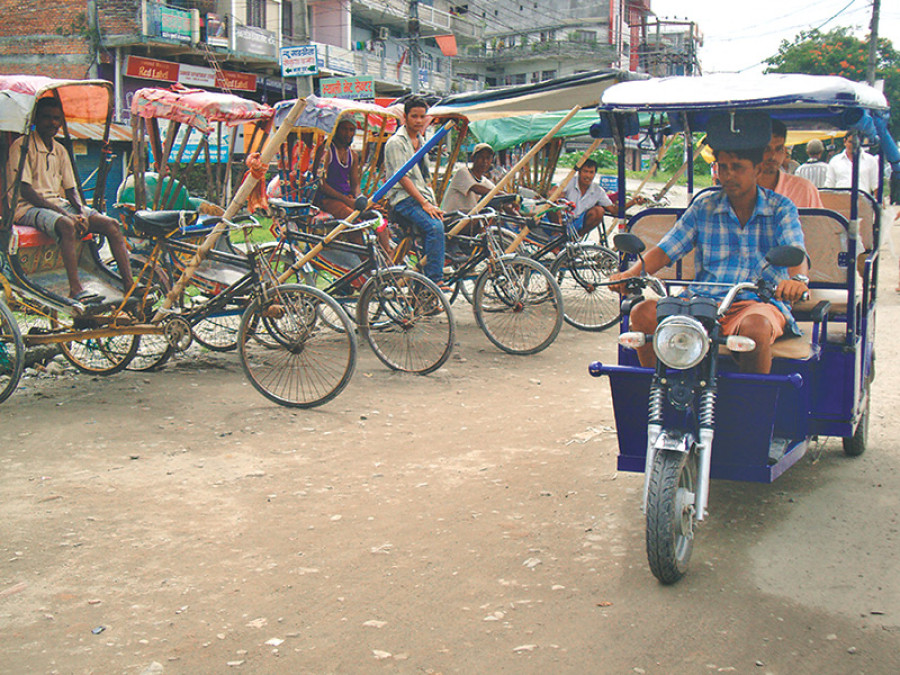Money
E-rickshaws electrify transportation sector in Tarai
When India imposed a trade embargo on Nepal in 2015, virtually halting gasoline supplies, traffic came to a grinding halt in all major cities across the country. Motor vehicles went off the streets, and people had to travel on foot.
Arjun Rajbansi & Bed Raj Poudel
When India imposed a trade embargo on Nepal in 2015, virtually halting gasoline supplies, traffic came to a grinding halt in all major cities across the country. Motor vehicles went off the streets, and people had to travel on foot.
But there were a few towns which were unaffected by the gasoline shortage. Thanks to e-rickshaws, locally known as City Safari, commuters were able to get to their destinations. The use of electric three-wheelers has seen an abrupt rise since then.
E-rickshaws have emerged as an alternative for low-income people who are the hardest hit by lack of transportation. Students and farmers have been the biggest beneficiaries of this environment-friendly vehicle which is relatively inexpensive.
E-rickshaws have also emerged as an affordable and accessible means of transport for rural farmers. Nowadays, farmers transport their harvest to market using e-rickshaws.
A short commute within the city costs Rs20-50 per passenger while the fare for long distance depends on the route. Moreover, Nepal can reduce its ballooning dependency on imported petroleum products if e-rickshaws are promoted, particularly in the southern plains where they can run smoothly and are a low emitter.
These electric vehicles can travel more than 100 km on a full charge. However, they cannot run in hill and mountain areas.
Lila Rijal, a local of Udayapur, recounts her experience of riding an electric vehicle. She was travelling to Itahari, a popular city in the Eastern Region, to meet her relatives.
It was already 8 pm on Monday, and she did not know where to go after getting down at Itahari. But she was relieved as a City Safari was there to help her.
“It’s comfortable and can accommodate many people,” says Bigyan Limbu of Damak, Jhapa. “Moreover, travelling in a City Safari is relatively inexpensive.”
The e-rickshaw is revolutionizing transport. It has replaced pedal-power cycle rickshaws in urban areas, and demand is growing.
According to the statistics of the Department of Transport Management, imports of e-rickshaws and e-tempos jumped to a staggering 20,029 in the last fiscal year, up 38 percent from the previous year.
In Itahari Sub-Metropolitan City, 1,597 e-rickshaws have been registered in the last two years. However, there are a few emerging challenges. Bishnu Basnet, DSP of the Regional Traffic Office Itahari, said they had been facing challenges to manage the growing number of e-rickshaws in the core area.
“Although, City Safaris have been allocated routes away from the main roads, they have been operating on highways, as the secondary roads which feed traffic to the main highways are not properly managed,” says Basnet.
For many unemployed youths, electric rickshaws have become an attractive sector due to its low investment and high yield. Each safari earns Rs1,000 daily. Apart from the cost of charging the batteries, there are no other costs involved. “That’s why demand has exceeded supply,” said Krishna Basnet, a City Safari dealer.
For Jitendra Dhimal of Lakhanpur Jhapa, City Safari is a means of family transport. “A City Safari can accommodate a whole family and is affordable,” says Dhimal. “In the past, travelling 2-3 km on foot to the market used to be routine. But now, things have changed. Safari is there to take us anywhere.”
Dil Maya Shrestha of Morang, Urlabari says e-rickshaws have become a means of providing immediate employment for migrant workers who return to their homeland. “Most returnees have purchased e-rickshaws and are making a handsome income.”
Netra Bahadur Khadka, member of the Nepal Auto Rickshaw Driver Association, says he has been earning Rs1,000 daily driving electric auto-rickshaws. Khadka, who spent 10 years in the UAE, has been driving auto-rickshaws for the last six months. He feeds his family of four with the money.




 8.99°C Kathmandu
8.99°C Kathmandu














